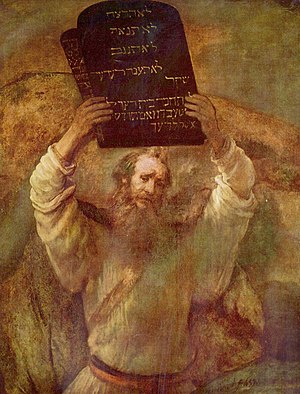 Image via Wikipedia
Image via Wikipedia
The “Ten Commandments” usually refers to two passages in the Old Testament, Exodus 20:2-17 and Deuteronomy 5:6-21. Catholic, Protestant and Orthodox Christians, as well as Jews break them apart differently, but in general they are:
- I am the Lord your God.
- You shall have no other gods before me. You shall not make for yourself an idol.
- You shall not make wrongful use of the name of your God.
- Remember the Sabbath and keep it holy.
- Honor your father and mother.
- You shall not murder.
- You shall not commit adultery.
- You shall not steal.
- You shall not bear false witness against your neighbor.
- You shall not covet your neighbor's wife or anything that belongs to your neighbor.
The writing of them occurs at Exodus 34:28. Again, for quick reference, Wikipedia has all the fine details.
The first four or five (depending on denomination) deal with our relationship to God, and the last several deal with our relationships with each other. These 10 are the basic Mosaic Law, there are also the Seven Noahide Laws which are basically the same Law but for Gentiles, and then 613 Mitzvot of God.
Christ’s Sermon on the Mount (Matthew 5-7) essentially brings what was Old Testament, that is, under the Law, into the New Covenant (See Hebrews 8:1-13 and Jeremiah 31:31-34). Christ says in Mark 12:28-31 that the whole of the Law of God breaks down to these two: that we love the LORD our God with all our heart, all our soul, all our mind and all our strength and that we love our neighbor as ourself. If you love God, and love your neighbor as yourself, the others come naturally. They come from the heart. We find that the Law only shows us our iniquity, our absolute inability to adhere to it, and how much we need God’s New Covenant in Christ, a covenant of Grace. Christians believe we are no longer under the old law, but the new, higher One.
“Do we, then, through faith make the law of no effect? in no way: but we make it clear that the law is important.” (Romans 3:31) We finally find out its true importance, its true place: our hearts. After all, God gave the Law to us in love - how to love Him and our fellow humans. Perfect love does not exist apart from God, so trusting in and relying completely on His love instead of ours is the answer. (He is God, after all.)
If this isn’t what you are looking for, we can certainly delve deeper, but literally hundreds of volumes of books - perhaps thousands - have been written on these so keeping it short is really tough. Keeping the laws is tougher (read impossible).
The first four or five (depending on denomination) deal with our relationship to God, and the last several deal with our relationships with each other. These 10 are the basic Mosaic Law, there are also the Seven Noahide Laws which are basically the same Law but for Gentiles, and then 613 Mitzvot of God.
Christ’s Sermon on the Mount (Matthew 5-7) essentially brings what was Old Testament, that is, under the Law, into the New Covenant (See Hebrews 8:1-13 and Jeremiah 31:31-34). Christ says in Mark 12:28-31 that the whole of the Law of God breaks down to these two: that we love the LORD our God with all our heart, all our soul, all our mind and all our strength and that we love our neighbor as ourself. If you love God, and love your neighbor as yourself, the others come naturally. They come from the heart. We find that the Law only shows us our iniquity, our absolute inability to adhere to it, and how much we need God’s New Covenant in Christ, a covenant of Grace. Christians believe we are no longer under the old law, but the new, higher One.
“Do we, then, through faith make the law of no effect? in no way: but we make it clear that the law is important.” (Romans 3:31) We finally find out its true importance, its true place: our hearts. After all, God gave the Law to us in love - how to love Him and our fellow humans. Perfect love does not exist apart from God, so trusting in and relying completely on His love instead of ours is the answer. (He is God, after all.)
If this isn’t what you are looking for, we can certainly delve deeper, but literally hundreds of volumes of books - perhaps thousands - have been written on these so keeping it short is really tough. Keeping the laws is tougher (read impossible).
For further reading:
- Rene Girard’s “I See Satan Fall Like Lightning”
- George Mendenhall’s “Ancient Israel's Faith and History: An Introduction To the Bible In Context”
- George Mendenhall’s “The Tenth Generation: The Origins of the Biblical Tradition”
- Yehezkel Kaufmann’s “The Religion of Israel, From Its Beginnings To the Babylonian Exile” trans. Moshe Greenberg.
- Paul G. Kuntz’s, “The Ten Commandments in History: Mosaic Paradigms for a Well-Ordered Society”
![Reblog this post [with Zemanta]](http://img.zemanta.com/reblog_e.png?x-id=0e7d91b8-384d-4ca3-bcac-8dae084b2dc1)
No comments:
Post a Comment